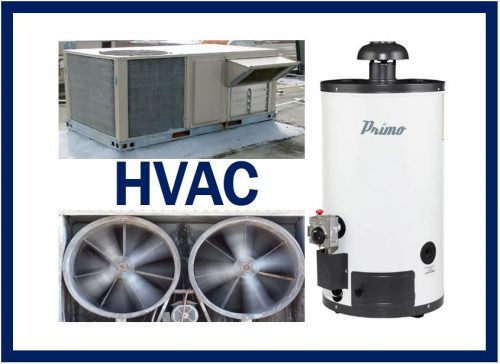Keeping your HVAC system in great shape will not only save you money, but you’ll also improve the longevity and avoid replacing the unit prematurely. Regular attention is critical if you are looking for peak efficiency. Your HVAC system needs to work overtime during the summer and winter seasons.

So, undertaking a thorough tune-up before these seasons begin is critical. The system consists of a heating unit (furnace), a cooling unit (blower), and an exterior unit (condenser). Each of these elements needs proper maintenance for the system to function effectively.
Before calling an HVAC contractor like Frank H Monroe HVAC, you can first inspect the unit in the following ways.
1. Check the Thermostat
Every HVAC system must have a thermostat to function effectively. You can adjust the settings so that your thermostat can turn on the A/C when the temperature rises above a predetermined level (say 72 degrees F). When the temperature falls below that level, it turns off the A/C. The thermostat consists of batteries, circuit panels, fuses, and wire contacts. A defect in any of these components will affect your system’s performance.
You know that your thermostat is bad if:
- It’s unresponsive or has no power
- The Ac won’t turn on
- The heater or A/C runs continuously
- The settings and room temperature don’t match
If only the thermostat is defective, fixing it will get your system up and running again. If your thermostat breaks down often, you need to check the circuit breaker.
If too much current is flowing through, the electrical load will eventually damage the delicate components. Incorrect wiring and wrong fuses can shorten your thermostat’s lifespan and cause frequent replacements that can be frustrating.
2. Clean and Repair the Fins
Remove the covers to expose the fins. If the fins are dusty, use a vacuum cleaner to get rid of dust and debris. Spray water through the fins with a garden hose gently to avoid damaging them.
Cleaning the fins helps to:
- Remove the warm air effectively
- Prevent the unit from overheating
- Ensure that every room is heated or cooled
- Prevent dirt from circulating in the house
Dirty fins will clog your system and cause it to work harder, leading to higher energy costs. The buildup of dust and debris in your furnace filter can also cause problems in your blower motor.
The whole system requires a comprehensive cleanup operation regularly. Experts recommend scheduling the cleanup annually. Such a regimen ensures that the technician replaces the damaged components so your unit can run smoothly throughout the year.
3. Check the Refrigerant
The refrigerant (freon) can either be in a fluid or gaseous state. It can absorb heat from the environment and use it to warm your house. Alternatively, it can cool your home when combined with other elements such as compressors and evaporators.
Maintaining the right refrigerant levels helps the system to function properly. You know that the system needs a refill if:
- The vents are blowing warm air throughout
- The electric bills rise significantly
- The refrigerant line is frequently icing up
- The refrigerant line produces a hissing sound
The refrigerant plays a key role in the system as it aids the heat transfer process.
4. Check the Evaporator Drain
The evaporator drain is an exit route for excess moisture. It converts excess humidity into the water through condensation.
Keeping the evaporator drain in good shape helps to:
- Facilitate disposal of moisture down the drain
- Prevent the development of mold and mildew
- Prevent flooding
- Protect the electrical components
Cleaning your air conditioner’s drain line can have a positive impact on how effectively the unit runs. Clogs in the system can cause elevated humidity levels and algal growth.
5. Unclog the Unit
A clogged drain causes algae and mold to grow in your system. Over time, the system will come to a halt as the refrigerant cannot flow as it should.
You unclog the HVAC drain line in the following ways:
- Turn off the power and locate the AC drain line
- Push a thin brush through the drain line
- Connect a wet/dry vacuum cleaner to the drain and run it for a minute
- Locate the vent tee and flush it with cold water
Clogged filters affect normal airflows and significantly reduce efficiency. Replacing the filters is one of the most critical HVAC maintenance tasks.
6. Check the Wiring
Electrical problems are the main reasons why the cost of HVAC maintenance escalates. Loose wires can cause electrical shorts that damage the entire system. Look out for the following signs of electrical damage:
- Loose wires caused by vibrations in the system
- Water damage as a result of clogged filters
- Defective fuses
- Defective blower motor
- Poor electrical wiring
- Damaged cable insulation
If the HVAC circuit breaker trips often, check if the fuse is damaged. If the electrical load is too high, you need to upgrade the current fuse with a higher-amperage alternative to prevent the problem.
Locating the faulty wires can be difficult. Once you find them, the repair can be relatively easy if you have the necessary skills and tools. If not, electrical circuits are a no-go-zone as they can pose risks to your home’s wiring system. Loose and poorly insulated wires are dangerous, meaning that you need to call a technician immediately.
Finally, Contact a Technician
While you can detect the problems that affect your system, you need an expert technician to solve them. Also, the ducts are fragile and require proper handling during cleaning and tune-up to improve the airflow. At Frank H Monroe HVAC, we have the necessary skills and tools to diagnose and repair the faults.
Have you detected any signs of trouble in your home HVAC system? Contact us today, and we’ll provide comprehensive tune-up services to keep it running efficiently.
Interesting Related Article: “How much does it cost to repair HVAC“

